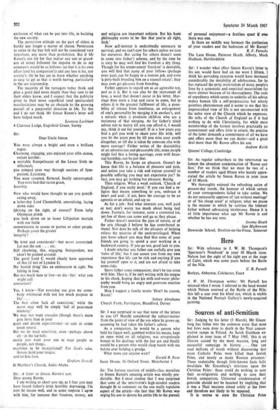Sir : A letter to Simon Raven's son:
Dear young Raven,
I am writing to cheer you up, as I fear you may have found father's letter horribly depressing. I'm sure he means well, and in some respects I agree with him, for instance that freedom, money, sex
and religion are important subjects. But his basic philosophy seems to .be 'See that you're all right, Jack.'
Now self-interest is undoubtedly necessary to survival, and we can't care for others unless we care for ourselves. But caring for others doesn't seem to come into father's scheme, and by the time he is sixty he may well find his freedom a dry thing. Though for his temperament 'freedom' is desirable, you will find that many of your fellows (perhaps even you), can be happy in a routine job, and even 'a jerry-built breeding box on a council estate'; they may even get pleasure from breeding.
Father appears to regard sex as an agreeable toy, and so it is. But it can also be the instrument of love, a word that doesn't occur in his letter. Mar- riage does seem a trap and curse to some, but to others it is the greatest fulfilment of life, a possi- bility of release from loneliness, an enlargement of one's personality by merging it in another's, and a miracle when it produces children who are a testimony of that merging. As for father's timid advice not to marry till you can afford it, I would say, think it out for yourself. If in a few years you find a girl you wish to share your life with, will you let the years pass by till you miss your youth altogether, or till she is taken by someone else with more courage? Father writes of the desirability of an adventurous and pleasurable life; some people might feel that a loving marriage, even with finan- cial hardship, can be just that.
This Raven, he harps on pleasure. Doesn't he know that life is a balance of pleasure and pain, and unless you take a risk and expose yourself to possible suffering you may not experience joy? In fact, you may get nothing but pleasure. Boring.
Then religion. What a weak outlook. 'Church of England, if you really must.' If you can find a re- ligion that means something to you, embrace it heart and soul: if not, have the courage to be an agnostic or an atheist, and say so.
As for a job: find what interests you, well paid or not; don't worry too much about being tied down. Farmers, for instance, seem a contented lot, yet few of them can come and go as they please.
Father doesn't mention the joys of nature, or of the arts (though I believe he has contributed to them). Nor does he talk of the pleasure of helping relieve the miseries of the underprivileged. When you leave school you may find that some of your friends are going to spend a year working in a backward country. If you go too, good luck to you.
I doubt whether any father can usefully give you 'rules of life,' but I can assure you from my own experience that life can be rich and exciting if you lay yourself open to it, and are not afraid to take some risks.
Spare father some compassion; don't be too cross with him. That is, if he isn't writing with his tongue in his cheek, hoping that his milk-and-water philo- sophy would bring an angry and generous reaction from you.
May I suggest a family motto 'Don't be craven, Raven.'


































 Previous page
Previous page